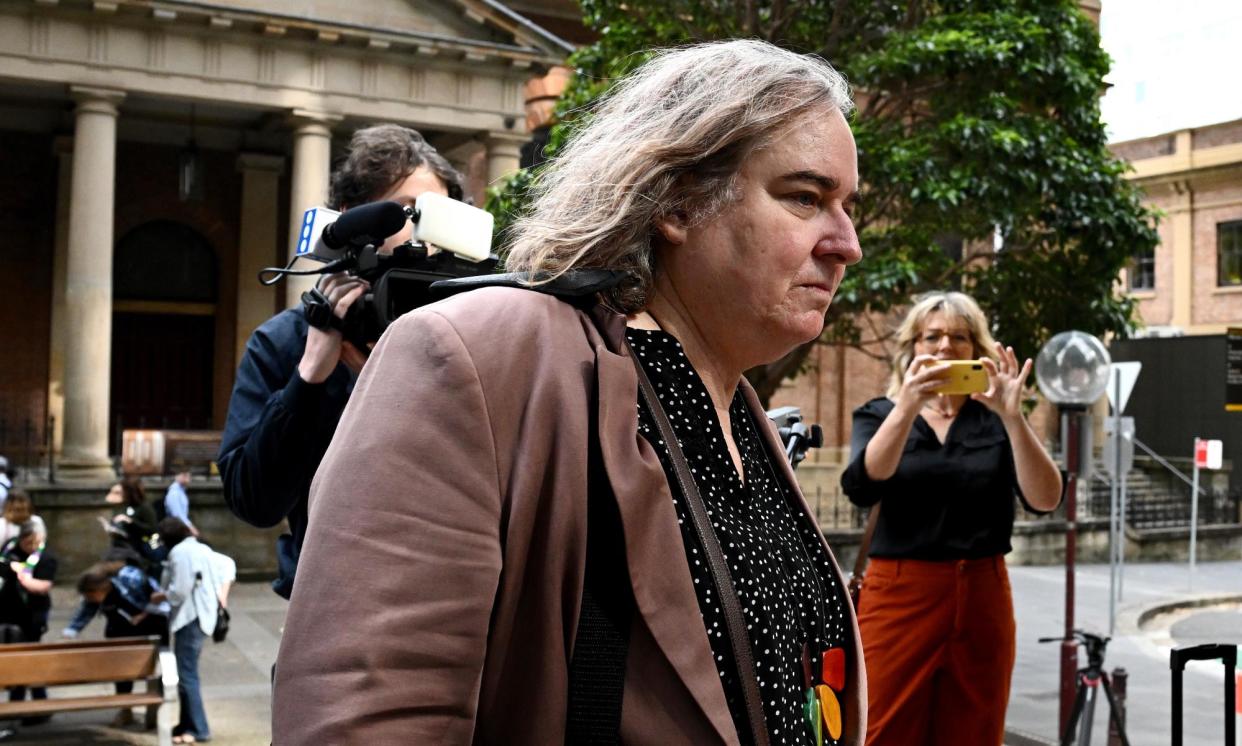Tickle v Giggle: transgender woman sues female-only ‘online refuge’ for alleged discrimination in landmark case

An app intended as an “online refuge” for women became the site of alleged gender identity discrimination, a court has heard in a landmark case that will test the meaning and scope of the Sex Discrimination Act.
Roxanne Tickle, a transgender woman from regional New South Wales, is suing the women-only social media platform Giggle for Girls after being blocked from using the app.
In a lawsuit filed in December 2022, Tickle claimed she was unlawfully barred from using Giggle in September 2021 after the firm and its CEO, Sall Grover, said she was a man. Tickle is seeking damages.
Former Liberal party candidate Katherine Deves, representing Giggle, failed to have the case thrown out of court.
Related: Transgender woman sues female-only app Giggle for Girls for alleged discrimination
The case is the first time alleged gender identity discrimination has been heard by the federal court and goes to the heart of how gender identity – and being a woman - is interpreted.
On Tuesday, federal court justice Robert Bromwich heard Tickle has lived as woman since 2017, has a birth certificate stating that her gender is female, had gender affirmation surgery and “feels in her mind that psychologically she is a woman”.
In her opening remarks, Tickle’s barrister Georgina Costello KC said that “Ms Tickle is a woman” but that “the respondents flatly deny that fact”.
“The respondents have insisted on describing Ms Tickle as a man and using ‘he’,” she said. “Persons can change gender and that is what happened here.”
Tickle gave evidence late on Tuesday afternoon. When asked to detail what “living as a female” meant, the accountant described taking hormones that changed her body, having gender affirmation surgery and undergoing social transitions.
She has changed her gender markers on government documents and spent time and money on her wardrobe and removing her facial hair, as well as using female changing rooms and playing in a female hockey team, she said.
“Up until this instance, everybody has treated me as a woman,” she told the court.
“I do from time to time get frowns and stares and questioning looks which is quite disconcerting … but they’ll let me go about my business.”
Giggle and Grover’s barrister, Bridie Nolan, said the focus must be on biological sex.
“Sex is discriminatory, it always has been and always will be … biological sex must prevail,” she said, referencing the legislative intention of the Convention on the Elimination of All Forms of Discrimination against Women’s insertion into the Sex Discrimination Act.
Changes to the act in 2013 made it unlawful under federal law to discriminate against a person on the basis of sexual orientation, gender identity or intersex status.
The court heard that Grover started the app after receiving trauma therapy for social media abuse while living in the US.
“It would be a place without harassment, mansplaining, dick pics, stalking, aggression … the vision was to create an online refuge,” said Nolan.
Onboarding to the app required the user to upload a selfie, which was verified as female by KairosAI gender detection software and then a human. It was intended to be an unobtrusive way to verify gender, the court heard.
Tickle claimed the software identified her as female in February 2021, but that her membership was later revoked.
The court heard that from its nascency, the app came under attack. Grover was labelled a trans-exclusionary radical feminist, or Terf, and received thousands of applications from men who attempted to join.
By September 2021, the app had 20,000 users but was shut down in August 2022.
In a social media post in 2022, Grover described Tickle as a “trans identified male” and alleged Tickle wanted her to be “re-educated”.
The defence is expected to call evolutionary biologist Colin Wright to give evidence in the trial.
The Australian Human Rights Commission, including the sex discrimination commissioner, is acting as a friend of the court, assisting by providing submissions about the scope, meaning and validity of the Sex Discrimination Act. Tickle made a complaint about Giggle to the Australian Human Rights Commission in 2021.
Giggle for Girls’ legal costs are being covered by a crowdfunding campaign which as of Tuesday morning had raised $471,300.
Supporters of both Giggle and Tickle gathered outside the federal court on Tuesday morning, some wearing the colours of suffrage.
The trial is scheduled to run for four days and is not being live-streamed because of unacceptable online behaviour during an interlocutory hearing in April 2023.


